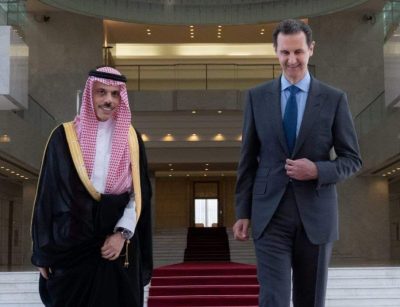The Winds of Change are Blowing through Damascus
Saudi Foreign Minister in Damascus

All Global Research articles can be read in 51 languages by activating the Translate Website button below the author’s name.
To receive Global Research’s Daily Newsletter (selected articles), click here.
Click the share button above to email/forward this article to your friends and colleagues. Follow us on Instagram and Twitter and subscribe to our Telegram Channel. Feel free to repost and share widely Global Research articles.
***
The winds of change are blowing through Damascus, as the Saudi Foreign Minister Prince Faisal bin Farhan arrived on April 18 in Damascus, Syria on his first visit since the outbreak of the conflict in Syria in 2011.
Syria has suffered a decade-long regional isolation from the US-NATO attack on Syria for regime change, which utilized the Muslim Brotherhood as foot soldiers. The Arab world has suffered from the western engineered “Arab Spring” and is now in the process of reclaiming independence and solidarity among those who had formerly met as brothers in the Arab League.
Syrian Foreign Minister Faisal Mekdad traveled to Tunisia on April 17 and met with his counterpart Nabil Ammar shortly after his arrival.
Earlier this month, Tunisian President Kais Saied ordered the appointment of an ambassador to the Syrian capital, Damascus. It followed the decision of the Syrian government to reopen its embassy in Tunis and appoint an ambassador.
Tunisia was also the subject of a US-NATO attack for regime change which used the Muslim Brotherhood, until the current President has stopped the country from being controlled by Radical Islam.
Syrian Foreign Minister Faisal Mekdad arrived on April 13 in Jeddah to meet Saudi Foreign Minister Farhan. Both countries are seeking “a political solution to the Syrian crisis that preserves the unity, security and stability of Syria.” This was the first visit to Saudi Arabia by a Syrian foreign minister since 2011.
The high level talks discussed “facilitating the return of Syrian refugees to their homeland, and securing humanitarian access to the affected areas in Syria”.
On April 14, delegates from Bahrain, Kuwait, Oman, Qatar, Saudi Arabia, UAE, Egypt, Iraq and Jordan met in Jeddah at Saudi Arabia’s request. The discussion centered on Syria’s return to its position in the Arab League, which will meet on May 19 in Riyadh. Qatar has voiced opposition to Syria returning to the group, and that stems from Qatar’s role as an American puppet used to finance the terrorists used in Syria.
Saudi Crown Prince Mohammed bin Salman (MbS) shocked the world on March 10 with a Saudi-Iran normalization agreement signed in China. Restoration of relations with Syria is a natural next step in the process of Vision 2030, the initiative designed by MbS which is based on peace and prosperity for Saudi Arabia and its neighbors.
Syrian President Assad has visited the UAE and Oman.
In March, Saudi Arabia and Syria began discussing restoration of diplomatic relations, bringing Syria back to the Arab League, and providing humanitarian aid to the earthquake victims since February 6.
Saudi Arabia has a long history of close relations with the US, and depending on them for security, which is by treaty.
However, both before and after taking office, President Donald Trump repeatedly ridiculed and humiliated the Kingdom of Saudi Arabia and its leaders.
While MbS visited the US, Trump called the Saudi King and said, “King, we’re protecting you. You might not be there for two weeks without us. You have to pay for your military; you have to pay.”
Earlier, during Trump’s campaign for office, he told his followers that the Arab Gulf leaders are wealthy, and should be ‘milked like cows’ for cash, and when no longer needed, should be slaughtered.
Trump was not satisfied with the half a trillion dollars he took from Saudi Arabia during his visit there: he demanded more.
The American humiliation of Saudi Arabia, its King and his son, MbS, carries a clear threat. Saudi Arabia has controlled the world oil prices through OPEC, previously keeping it at a price that pleased Washington. However, when President Joe Biden visited MbS to ask for him to increase oil production from the OPEC levels, MbS held firm to his decision, and did not acquiesce, or bow down to pressure from Biden.
The current geopolitical shift championed by MbS is the result of many factors, and not taken lightly. When the Aramco facility was attacked and put out of production for months, the Kingdom had to wonder why the American security and defenses failed.
US President Barack Obama, pushed Riyadh to sign contracts valued at $115 billion between 2011 and 2015, which meant Saudi Arabia accounted for 10 percent of the total sales of American weapons. At the same time, Obama’s attack on Syria for regime change was using Saudi Arabia as a financier.
The US State Department has issued statements denouncing the restoration of Arab relations with Syria. The American regime change project ended in failure, and hundreds of thousands dead, injured and millions of refugees abroad. Vietnam, Iraq, Afghanistan, Libya, and Syria are just a few of the failed projects cooked up at the US State Department, what some people call the “Deep State”.
Saudi Arabia has a new vision, which depends on independence from foreign meddling and control. There is a new Middle East emerging, and it is nothing like what President George W. Bush and Secretary of State Condoleezza Rice had demanded in 2006.
*
Note to readers: Please click the share button above. Follow us on Instagram and Twitter and subscribe to our Telegram Channel. Feel free to repost and share widely Global Research articles.
Steven Sahiounie is a two-time award-winning journalist. He is a regular contributor to Global Research.
Featured image is from MD

